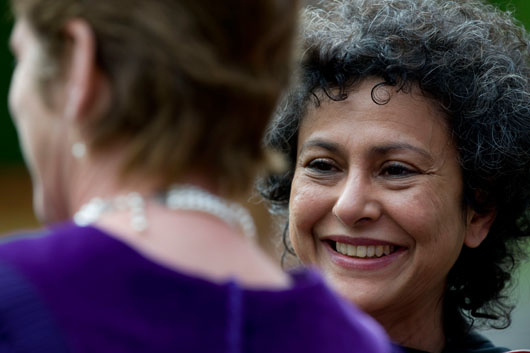Laureation address – Irene Khan

Irene Khan
Honorary Degree of Doctor of Laws
Laureation by Dr Jaremey McMullin
School of International Relations
Friday 25 June 2010
Chancellor, it is my privilege to present Irene Khan for the Degree of Doctor of Laws, honoris causa.
Irene Khan is a human rights advocate and activist of great distinction. She is also an accomplished, passionate, and provocative scholar of global poverty, justice, and equality.
Born in Bangladesh during the time of that state’s independence struggle with Pakistan, the abuses that occurred then were an important catalyst in shaping her activist stance towards human rights. Her skills in this area were then honed with law degrees from the University of Manchester and Harvard Law School, where she specialized in public international law and human rights. Following this, in 1980, Irene Khan went to work for the UN High Commissioner for Refugees, an organization to which she dedicated twenty years of service. Her time there included her appointment as the UNHCR Chief of Mission in India in 1995, the youngest UNHCR country representative at the time, and she led the UNHCR team in the Former Yugoslav Republic of Macedonia during the Kosovo crisis in 1999.
In August 2001, Irene Khan became the first woman, the first Asian and the first Muslim to be appointed Secretary-General of Amnesty International, the world’s largest human rights organization, and she served with distinction in that position until 2009. During her tenure at Amnesty International, she forcefully confronted the backlash against human rights that occurred in the wake of the attacks of September 11 and the US-led invasion of Iraq in 2003, including her leadership of Amnesty’s campaign to close Guantanamo. She broadened Amnesty’s work to include a prominent focus on economic, social and cultural rights, and emphasized issues of women’s human rights and violence against women. She also oversaw global campaigns against the death penalty and maternal mortality.
In her role as a prominent leader of a world organization, she forcefully underscored the power of leadership by example. She emphasised that women in elected and leadership roles can be powerful vehicles of change in their societies by demonstrating the value and potential of women’s lives. ‘A large part of the problem of maternal mortality,’ she has said, ‘is that women are not valued, their lives are not valued.’ Women leaders are uniquely positioned to challenge this perception, but Khan has also reminded us of a shared responsibility to confront direct and structural violence against women. Globally, she has challenged world leaders to confront their own leadership. As Irene Khan herself has written, ‘When the US, European and other western governments use security fears to chip away at human rights, they legitimise the practices of governments… that have never had any scruples about ignoring human rights in the name of security.’
More recently, Irene Khan has sharpened our understanding of globalisation, the world’s economic crisis, and global poverty. In 2009, she published The Unheard Truth: Poverty and Human Rights. The book’s premise is simple but subversive: poverty is not a problem of economics but of human rights. The structure of the global economy directly challenges the human rights of the poor, yet paradoxically is treated as the solution to world poverty.
Elsewhere, she states, ‘In the west poverty is often identified with humanitarian crises – a sudden lack of food and housing due to natural disaster or war – and with people living in places which are somehow “naturally poor” who simply can’t afford enough food, education or decent housing. These people are inevitably represented as needy, desperate and helpless. The underlying view is that they will get to our standard of living eventually – if they do things our free market way – through trickle-down economics, and meanwhile we’ll help a few of the most desperate out with a bit of philanthropy. The reality is very different.’
Her writing and advocacy situate poverty as the world’s worst human rights crisis. Her research attests to the ways in which the global economic crisis has made the human rights crisis worse. Efforts to end poverty will fail if driven solely by the imperative of boosting economic growth through investment, trade, new technology or foreign aid. The way forward, she argues, is to frame poverty in human rights terms. This will provide an ‘empowering framework for rights holders (those living in poverty)’ and an ‘accountability framework for duty holders (those who exercise power over poor people) to respect and protect their rights’.
Irene Khan’s unique skills as an advocate and as a social reformer have taken her all over the world and positioned her as an expert on many different issues. Fittingly, she has received many awards and honours to recognise her service. These have the twin effect of not only lauding her personal and professional accomplishments but of drawing attention to the issues and individuals, the themes and processes, that are often marginalised in world politics as well as academia. It is our pleasure to add to this recognition today in the hope of signalling our shared commitment to confronting inequality, injustice, violence, and discrimination.
Chancellor, in recognition of her major contribution to human rights, global justice and equality, I invite you to confer on Irene Khan the Degree of Doctor of Laws, honoris causa.
Category Awards